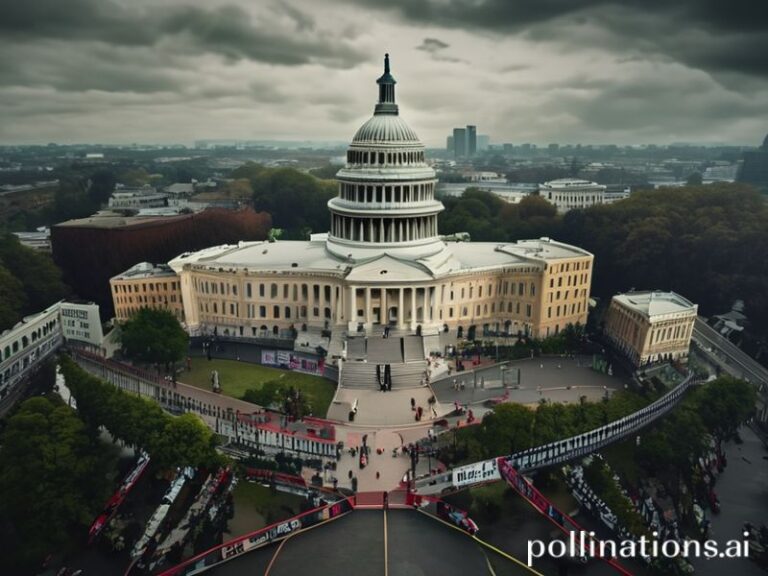Borderlands 3: How a Galactic Loot-Fest Became a Mirror for Earth’s Messy Borders
In the grand theatre of 2019, while real-world borders were being hardened with barbed wire and performative press conferences, Gearbox Software quietly released Borderlands 3 and invited the planet to spend 60 USD on a cartoonish map where every nation is a punchline and every passport is a gun permit. The timing was exquisite: the game dropped four months before the first recorded case of COVID-19, back when “lockdown” still sounded like a bad sequel to a Stallone film. In that brief window before the world learned to fear doorknobs, we all agreed to flee terrestrial politics for a galaxy where the only immigration policy is “shoot first, loot second.”
Borderlands 3’s marketing billed it as a “co-operative looter-shooter,” which is what you call capitalism when you want to sell it to teenagers. The premise: four Vault Hunters—representing, respectively, corporate espionage, religious zealotry, eco-militancy, and a twitch streamer—descend on the planet Pandora to crack open alien vaults and, incidentally, the global economy. Each copy sold was a tiny act of outsourcing: American servers hosted Chinese-manufactured consoles running code written in Quebec, all so a kid in Lagos could virtually rob a Martian bank while streaming on a South-Korean-owned platform. If that isn’t late-stage globalization in microcosm, I don’t know what is.
The game’s villainous duo, Troy and Tyreen Calypso, are influencer cult leaders who weaponize fandom like a thermobaric bomb. Their live-streamed sermons, equal parts TED Talk and hostage video, feel eerily prophetic in an era when Brazilian YouTubers can swing elections and TikTok determines the yen-to-dollar exchange rate. Watching them preach to a galaxy of disaffected bandits, you realize Gearbox didn’t create antagonists; they created a mirror. The joke, of course, is that the player’s solution to demagoguery is—spoiler alert—more demagoguery, only with bigger explosions and better merch.
International reception was as fractured as you’d expect. In Germany, the USK slapped an 18+ rating on it, citing “high-impact violence,” which is German for “we still feel bad about 1945.” Meanwhile, Japanese sales charts politely ignored it; apparently cel-shaded carnage doesn’t compete with gacha heartbreak. China banned streaming the game outright, proving once again that the fastest way to make something popular is to forbid it. Within weeks, Shenzhen back-alleys were hawking bootleg discs alongside rhino-horn powder and VPN subscriptions—a black-market trifecta of things that promise freedom but mostly deliver malware.
The real-world loot wasn’t inside the vaults; it was in the margins. Borderlands 3 became the first 2K title to ship without physical manuals, saving an estimated 1.2 million pounds of paper—roughly the weight of every promise made at COP26. Carbon offset by, well, offsetting. Meanwhile, voice actors in 15 languages recorded 4.7 million lines of dialogue, a polyglot cacophony that still couldn’t translate the phrase “day-one patch” into anything less than existential despair.
And then there are the microtransactions, those charming little border checkpoints where your wallet is strip-searched for loose change. Players in Venezuela discovered that farming in-game currency paid better than their national minimum wage, turning Pandora into a digital maquiladora. Somewhere in Caracas, a teenager is feeding his family by selling imaginary rocket launchers to a dentist in Ohio who just wants a shinier explosion. If Karl Marx had lived to see this, he’d have rage-quit history.
Four years on, Borderlands 3 is no longer cutting-edge; it’s a relic of the pre-pandemic optimism when we still believed the worst thing a planet could do was overshare on Instagram. Yet its legacy endures: a billion-dollar reminder that, given enough polygons and a broadband connection, humanity will gleefully reenact colonialism so long as the loot is randomized and the natives drop legendary assault rifles. The vaults were never on Pandora; they were in our pockets all along, jingling with micro-currencies and the faint, metallic laughter of shareholders.
As diplomats argue over tariffs and supply chains, somewhere a Maliwan corporate executive—voiced by a Canadian actor, animated in Seoul, rendered on a Californian server—is screaming, “You can’t spell ‘loot’ without ‘toil.’” He’s wrong, of course. You can’t spell ‘loot’ without ‘us.’ And that, dear reader, is the most honest border crossing of all.







